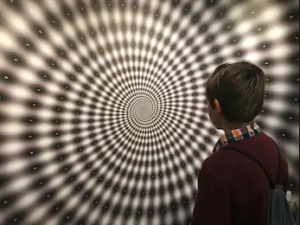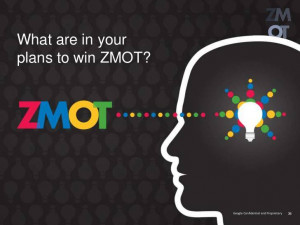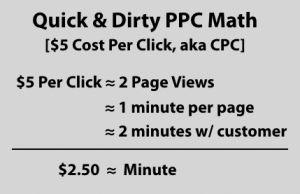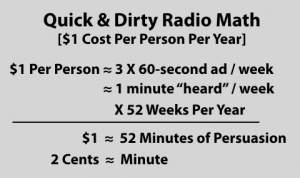 Whatever you’re paying per click, it’s extortionately, shockingly too much.
Whatever you’re paying per click, it’s extortionately, shockingly too much.
You don’t see that cause you’re under a spell.
No use arguing about it; let’s just do the math together, and maybe seeing the numbers will snap you out of it.
Are you willing to run the numbers with me?
Great, let’s say you’re paying $5 per click.
Now, without comparison that’s useless. If everyone else is paying 50 cents, you’re getting ripped. But if they’re paying $50, you’re getting a fantastic bargain.
And of course, the real comparison is cost vs. customer value.
If you’re converting those $5 clicks at 10%, but a customer is worth $500, it makes sense to keep pouring your money in, right?
 And that’s the spell.
And that’s the spell.
Google’s telling you they’re giving you a chance to sell a customer, who’s ready to buy right now, every time you hand them five dollars.
That’s the story they’re weaving with their “Zero Moment of Truth” jargon.
It’s the song and dance used to make that five dollars per click look “cheap”
Breaking the Spell
To break the spell, we have to stop thinking of the time you’re buying to be in front of the customer as “special” and just view it as time spent in front of the customer.
So how much time do you get for five dollars?
 Well, on average, you get about two minutes of time.
Well, on average, you get about two minutes of time.
Average page views for PPC-generated clicks is about 2 pages. And people spend about a minute or less per page.
Your mileage may vary, so do your own math, using your own numbers.
Now, let’s compare PPC to mass media, using radio as an example.
Getting Clarity on Cost by Comparing PPC to Radio
When Wizard of Ads Partners negotiate radio for a client, the metric we use is:
Cost-Per-Person-Per-Year.
How much does it cost to reach a listener three times per week, fifty-two weeks per year?
And that cost usually comes in under a dollar.
But to make the math easy, we’ll just round up to a dollar per person per year.
So for a dollar spent on radio, I’m getting minute long chats with my customer, three times every week, for 52 weeks.*
 But let’s be honest, they may not be fully paying attention during each chat, which is one reason I want to reach them three times during the week.
But let’s be honest, they may not be fully paying attention during each chat, which is one reason I want to reach them three times during the week.
But even if we say it’s a minute a week for 52 weeks, that’s pretty darn close to an HOUR’S worth of the customer’s time bought for one dollar.
PPC is delivering two minutes for five dollars.
Radio is delivering damn near an hour for one dollar.
Now, I know your objection.
As you stare at this in disbelief and the spell tries to retain its hold on you, you’re thinking:
“Yeah, but you’re saying the same thing over and over, only switching out the ad every month.”
And I have two answers for you:
- Repetition is your friend. How many times do you tell your spouse or children that you love them? Do you think the persuasion hurts the messaging or helps? When it comes to bonding, repetition is crucial, not a hindrance.
- Fine, let’s say (for the sake of argument) that it’s only 12 minutes for one dollar. With radio, you’re still paying just over 8 cents per minute. Now compare that to $2.50 per minute for PPC.
“Yeah, but the people I’m reaching with PPC are in the market right now — I can sell them. The people on radio aren’t in the market”
And this is the crux of the spell.
And like all good spells, there’s a kernel of truth to it; yes, the PPC prospects are generally ready to buy today.
But for a mass market product, you can be sure that many of those radio people WILL enter the market at some point during the year.
I’ve even got a different article that does the math on this, taking into account your product’s buying cycle.
Now here’s the kicker: when those radio-reached customers do enter the market, they’ll already know about you, and feel better about you than the competition.
And that means three really cool things:
- They’ll likely search on your name rather than your industry “key words” when going to google. Meaning you win the sale before it even started, and those other suckers on google are straight out of luck. They go to your site, get your number, and call you without even considering anyone else.
- If they do search keywords on google, they’ll recognize your name in results, and your ads’ Click-Through-Rate and Quality Scores will go up, causing your bid prices to go down.
- When they call you up or show up in your store, they’ll be pre-sold and willing to pay premium pricing (assuming your ads positioned you as premium). No more competing on price with the cheap-bid-charlies and ankle-biters of your industry.
And you’ll get all that for less than a dollar per person per year.
So, yes, you can run both PPC and mass media together, and your mass media ads will make your PPC work better than ever.
But still, think about that comparison, in terms of what you get for your dollar with mass media vs. what you get for it from PPC.
 This is why I consider PPC not only shockingly expensive, but spellbinding in the way that it’s able to hide this dirty little secret.
This is why I consider PPC not only shockingly expensive, but spellbinding in the way that it’s able to hide this dirty little secret.
Once you break out of the spell and move into mass media, you’ll never look back.
And if you want help breaking out to the next level, I’d be happy to help.
*P.S. Sure, not all radio ads are 60-seconds. In fact, most are 30-seconds. But you’ll find the math still works out considerably in radio’s favor even when running the calculations using this shorter ad format. And, yes, the math also works out in TV’s favor, too, but it’s much clearer and easier to calculate with radio
- Are You Paying for Too Much for the Wrong Keywords? - July 15, 2024
- Dominate Your Market Like Rolex — 4 Powerful Branding Lessons - July 3, 2024
- Military-Grade Persuasion for Your Branding - June 25, 2024
